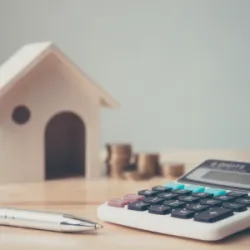
What You Need to Know About Buying a House After a Bankruptcy Filing
In 2021, 453,438 non-businesses filed for bankruptcy, down from 741,168 the previous year, according to the Administrative Office of the US Courts.
Those numbers aren’t just statistics—they represent individuals and families looking to get out from under debt and make a fresh start.
One of the most persistent myths about bankruptcy—and one that deters many from filing—is that it locks you down financially for 7 to 10 years.
Most people think you can’t have credit cards, take out loans, or buy a house until a bankruptcy has completely disappeared from your credit history.
Luckily, that simply isn’t true, and one of the advantages of bankruptcy is that it allows you to start over and almost immediately start rebuilding your credit.
That rebuilding process can even lead to getting out a loan to buy a house and then making those mortgage payments in full and on time every month.
Here’s everything you need to know about getting a mortgage after bankruptcy and how to successfully navigate the process.
How Long Do I Have to Wait to Buy a House?
Waiting Period Requirements for a Mortgage After Bankruptcy
The first thing to know is that most mortgage lenders require a waiting period after a bankruptcy.
This waiting period is a minimum that usually ranges from 2-4 years, depending on the lender, the type of bankruptcy you filed for, and the type of loan you are seeking.
The waiting periods for Chapter 7 bankruptcy are usually:
FHA and VA Loans: 2 years
USDA Loans (for qualified rural property): 3 years
Conventional Loans: 4 years
Non-Qualified Mortgage Loans: No set waiting period
The waiting periods for a Chapter 13 bankruptcy are usually:
FHA and VA Loans: 1 year
USDA Loans: 1 year
Conventional Loans: 2 years from discharge date or 4 years from dismissal date
Non-Qualified Mortgage Loans: No set waiting period
If there were extenuating circumstances like an illness, divorce, job loss, or primary earner death, these waiting periods may be shortened.
It is important to note that a specific lender may require waiting periods that are longer than these minimums, and that not all lenders will work with borrowers who have declared bankruptcy.
There are, however, many lenders who will work with potential homebuyers after a bankruptcy, so don’t be discouraged if you encounter one who doesn’t.
When the Post-Bankruptcy Mortgage Waiting Period Begins
The waiting period begins once your bankruptcy has been discharged or dismissed, not when you file.
- For Chapter 7 bankruptcies, this can be as soon as 4 to 7 months after you file.
- For Chapter 13 bankruptcies, the debt repayment period lasts for 3 to 5 years, after which the debt is either discharged or dismissed, depending on the court.
What that means is that you may have to wait 4 ½ years or more to get a conventional mortgage loan after Chapter 7.
Or you might be able to get a loan as soon as a year and a half if you have extenuating circumstances and an FHA or VA loan application.
Those who file Chapter 13 might have to wait as long as 9 years to get a regular mortgage, although non-qualified loans—which have less strict terms, but may be more expensive and risky—can help you get around this.
FHA loans may be another good option for qualified Chapter 13 filers.
If possible, you may want to discuss mortgage waiting periods with your bankruptcy attorney when deciding what type of bankruptcy to file.
Credit Score and Down Payment Mortgage Requirements After Bankruptcy
In addition to the waiting period, most lenders require a certain minimum credit score and minimum down payment for each type of loan.
FHA Loans
Minimum credit score: 580, or 500 with 10% down payment
Minimum down payment: 3.5% or 10%
VA Loans
Minimum credit score: none, although some lenders require 620
Minimum down payment: none
USDA Loans
Minimum credit score: none, although some lenders require 640
Minimum down payment: none
Conventional Loans
Minimum credit score: 620
Minimum down payment: 3%
Non-Qualified Mortgage Loans
Minimum credit score: varies by lender
Minimum down payment: varies by lender
How to Get a Mortgage After Bankruptcy
Rebuild Your Credit
There’s no sugar-coating it: bankruptcy negatively impacts your credit score and you will need to work to rebuild it.
The good news is that there are more ways than ever for people to reestablish good credit after a bankruptcy.
You can do things like getting a secured credit card, making monthly payments on time and keeping your debt-to-credit and debt-to-income ratios low.
These things will help you take charge of your financial future and improve your credit score.
If you are discouraged by the waiting period requirements for a post-bankruptcy mortgage loan, know that every minute you wait is an opportunity to get your credit score higher so you can qualify.
Save Money for the Down Payment
The more you save for a down payment, the more likely you are to get a mortgage loan with favorable terms and a good interest rate.
While certain types of government loans require low or no down payments, saving more can make you a more attractive loan candidate, and it can also help lower the cost of your mortgage.
You can also use saved money to pay for points up front and lower your overall mortgage interest rate.
Shop Lenders
It is a good idea to talk to multiple lenders to see what sort of waiting periods and mortgage qualifications each one requires.
Be sure to mention any extenuating circumstances that may lead them to loosen stringent requirements for post-bankruptcy borrowers.
Working with a mortgage broker may also help you qualify, cut through red tape, and find mortgage loans with more favorable terms.
Be Persistent and Patient
Although bankruptcy presents some challenges for home buyers, it doesn’t mean you can’t own a home.
If you have trouble qualifying at first, keep at it and work to improve your credit report while shoring up your savings.
Give yourself a 2- to 3-year time horizon to get your finances in order, save money and rebuild your credit history.
Considering Filing for Bankruptcy Protection?
Speights is here to help. We can guide you through all your legal options and help you make a plan for the future. Call (770) 479-1500 for a confidential consultation with one of our bankruptcy attorneys today.








